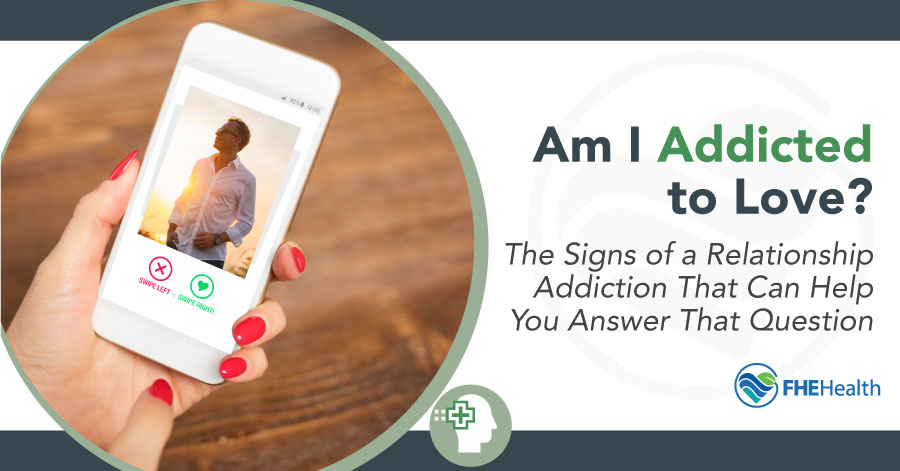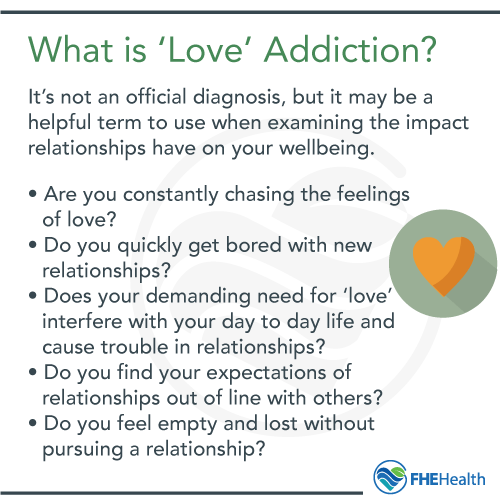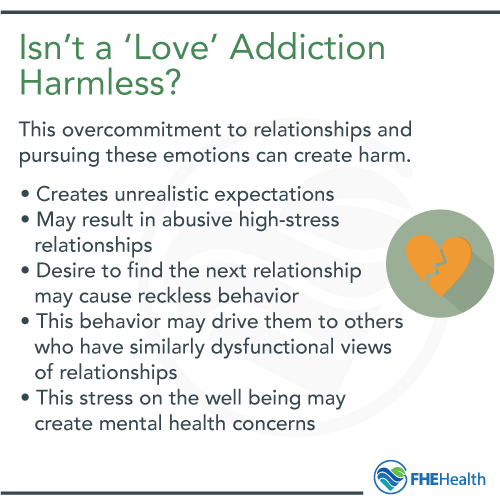
You’ve heard love described as intoxicating, but is it possible to have a true love addiction? You may be addicted not to a specific person but to the concept of being in love. It doesn’t help when romance novels and movies paint an unrealistic picture of what love is and you find yourself jumping from one relationship to the next. In some cases, this type of situation is unhealthy. Some people may be struggling with relationship addiction.
What Is Relationship Addiction?
 ‘Addiction to love’ doesn’t sound like a type of mental health disorder, and it isn’t classified as such. However, this colloquial term is a helpful way to describe behavior and the way you function both when you are in a relationship and when you are not in one. When you are not in a relationship, do you feel unable to function? Do you feel incomplete? Are you afraid to be alone? This could be an indication of relationship addiction.
‘Addiction to love’ doesn’t sound like a type of mental health disorder, and it isn’t classified as such. However, this colloquial term is a helpful way to describe behavior and the way you function both when you are in a relationship and when you are not in one. When you are not in a relationship, do you feel unable to function? Do you feel incomplete? Are you afraid to be alone? This could be an indication of relationship addiction.
The opposite can be true, too. You may be in a relationship that’s taken over your life. You’re not focused on yourself and your own goals any longer but just on your relationship. Your purpose in life isn’t as clear.
There’s no medical diagnosis for being addicted to the feeling of love. However, it’s a term that can apply to situations where you are constantly chasing specific feelings associated with being in a relationship. Like any type of addiction, love addiction can result in negative consequences, including being unable to recognize problems or experiencing withdrawal when you are alone.
What Is It You’re Addicted To?
You may be unsure of how you could be addicted to love. However, it’s easy to see why love can be an addicting feeling. Classic feelings of love mean you want to spend time with someone, you have fun and you feel uplifted. It feels good to have a partner, and you think about them often. Studies published in the U.S. National Library of Medicine have found a true level of addiction to romantic love is possible.
Infatuation like this, though, can easily turn into obsession. Limerence, for example, occurs when a person becomes obsessed with another person. Many times, this isn’t something you struck out to do — you didn’t find someone to obsess about. However, now, that’s all you can think about. Limerence doesn’t always have a sexual goal or presence. Rather, you have a strong desire to be with someone, and you want that person to want to be with you.
Lust is another type of feeling. Here, there’s a strong desire for sexual relations. Lust is a chemical-based feeling to some level, but like any other form, it can become an addiction.
These emotions can all lead to a feeling that you enjoy and want present in your life. Imagine what you may believe happens to a person who uses drugs. When they take that hit, they feel good mentally and physically. They want to feel the same way again, so they continue to use. The same can happen with those feelings of love. You like the way they make you feel, so you seek out opportunities to make it happen again.
How Can Love Addiction Be Like Other Forms of Addiction?
With relationship addiction, there’s no external chemical source to create that high you are seeking. There is no drug or alcoholic substance that can create it. Rather, you need to seek out experiences. In that way, relationship addiction is much like gambling or video game addictions. The desire to seek out the activities that create that feeling become hard to overlook.
There’s a significant difference, though. In relationship addiction, the person you are interacting with and wanting to spend time with isn’t trying to create an addiction in you. For example, with drugs, there’s a chemical change that occurs in the brain to continue this desire for more. That’s not present in relationship addiction. You are more in control over it than you may believe.
What Are the Dangers of Love Addiction?
 There are dangerous consequences to relationship addiction, both to yourself and to those you enter into those relationships with. A love addiction can prove dangerous in various ways:
There are dangerous consequences to relationship addiction, both to yourself and to those you enter into those relationships with. A love addiction can prove dangerous in various ways:
- It can create unrealistic goals and desires in every relationship you enter into from that point on.
- It can create dysfunctional behavior, including abusive treatment of another person you hope to engage in a relationship with.
- Individuals may become determined to find love and move from relationship to relationship quickly and in a reckless fashion.
- Some may find others who are co-dependent, maintaining such relationships just to maintain those feelings of love even when it is unhealthy to do so.
- Severe anxiety and depression-like symptoms can occur in someone who is facing a breakup.
What Are the Signs of Relationship Addiction?
Obsessive love can feel smothering to the other person. It can be a bit easier to see from the outside looking in, but how do you know if you have it?
- Do you break up and then move on to someone else right away?
- Do your friends often tell you that the person you are in a relationship with isn’t good for you?
- Do you feel empty and lost when the person is not with you?
- Do you go through breakup and makeup cycles just so you can feel more romantic or passionate?
- Do you feel as if you have no life outside of your relationship?
If you feel like any of these situations describes your life, it may be time to consider your options as a love addict. Taking this seriously could improve your quality of life.
What Type of Love Addiction Treatment Is Available to You?
Facing love addiction may be different for each person. In most cases, realizing what you’re facing is the primary step. It’s always a good idea to take a step back and explore who you are outside of that relationship. If you feel completely defined by it, that’s an indication you may need help.
Seeking out counseling support is an option. Though love addiction isn’t a medical diagnosis or a mental health disorder, it can lead to high stress, anxiety and depression in some people. Seeking help from a therapist to explore why it’s happening is an important way to reclaim your life.
FHE Health Can Offer Support for Mental Health Needs
At FHE Health, we provide counseling support to people facing mental health challenges of all types. Contact our counselors if you are experiencing anxiety, depression or other high risks to your mental health. Our trusted team of compassionate counselors is available to you at 833-596-3502.






